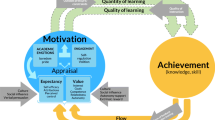Abstract
The present study examines the manifestation of structural differences in the manner in which men and women students perceive and engage the content and context of learning. These differences are explored, and shown to be consistent, within a hierarchy of progressively more complex conceptual models of student learning. Conclusions are that structural gender variation differences emerge in terms of deep/strategic rather than surface, forms of learning behaviour: men students distinctively manifest and qualify deep/strategic learning behaviour in terms of operation and comprehension learning styles, while women students integrate these styles in a manifestation of style versatility that is clearly organised and not achievement motivated. An apparently separate female trait is distinguishable in terms of comprehension learning style and achievement motivation. It is argued that gender differences constitute a potentially important and neglected source of variation in student learning which, when detected in context, can and should be explicitly managed by academic practitioners.
Similar content being viewed by others
References
Belenky, M., Clinchy, B., Goldberger, N., and Tarule, J. (1986).Women's Ways of Knowing: The Development of Self, Voice, and Mind. New York: Basic Books.
Biggs, J.B. (1978). ‘Individual and group differences in study processes’,British Journal of Educational Psychology 48, 266–279.
Clinchy, B.M., and Zimmerman, C. (1982). ‘Epistemology and agency in the development of undergraduate women’, in Perun, P. (ed.),The Undergraduate Women: Issues in Educational Equity. Lexington, MA: D.C. Heath. pp. 161–182.
Cureton, E.E., and D'Agostino, R.B. (1983).Factor Analysis: An Applied Approach. Hillsdale, NJ: Erlbaum.
Entwistle, N.J., and Ramsden, P. (1983).Understanding Student Learning. London: Croom Helm.
Gilligan, C. (1982).In a Different Voice: Psychological Theory and Women's Development. Cambridge, MA: Harvard University Press.
Gilligan, C., Ward, J.V., McLean Taylor, J., and Bardige, B. (1988).Mapping the Moral Domain. Cambridge, MA: Harvard University Press.
Hudson, L. (1972).The Cult of the Fact. London: Cape.
Lefcourt, H.M., Von Baeyer, C.L., Ware, E.E., and Cox, D.J. (1979). ‘The multidimensional-multiattributional causality scale: the development of a goal specific locus of control scale’,Canadian Journal of Behavioral Science 11, 286–304.
Marton, F. (1976). ‘What does it take to learn? Some implications of an alternative view to learning, in Entwistle, N. (ed.),Strategies for Research and Development in Higher Education. Amsterdam: Swets and Zeitlinger. pp. 32–33.
Meyer, J.H.F. (1991). ‘Study orchestration: the manifestation, interpretation and consequences of contextualised approaches to studying’,Higher Education 22, 297–316.
Meyer, J.H.F. (1994). ‘Academically at risk study behaviour: a categorisation procedure and an empirical exploration based on programmable logic’,South African Journal of Higher Education 8, in press.
Meyer, J.H.F., and Dunne, T.T. (1991). ‘The study approaches of nursing students: effects of an extended clinical context’,Medical Education 25, 497–516.
Meyer, J.H.F., and Muller, M.W. (1990). ‘Evaluating the quality of student learning. I—an unfolding analysis of the association between perceptions of learning context and approaches to studying at an individual level’,Studies in Higher Education 15, 131–154.
Meyer, J.H.F., and Sass, A. (in press). ‘The impact of the first year on the learning behaviour of engineering students’,International Journal of Engineering Education 0, 000-000.
Meyer, J.H.F., and Watson, R.M. (1991). ‘Evaluating the quality of student learning. II — study orchestration and the curriculum’,Studies in Higher Education 16, 251–275.
Miller, C.D., Finley, J., and McKinley, D.L. (1990). ‘Learning approaches and motives: male and female differences and implications for learning assistance programs’,Journal of College Student Development 31, 147–154.
Murphy, R.J.L. (1982). ‘Sex differences in objective test performance’,British Journal of Educational Psychology 52, 213–219.
Nagao, H. (1973). ‘Asymptotic expansions of the distributions of Bartlett's test and sphericity test under the local alternatives. Annals’,Annals of the Institute of Statistical Mathematics 25, 407–422, (as presented in) Anderson, T.W. (1984).An Introduction to Multivariate Statistical Analysis, 2nd Edition. New York: Wiley.
Newstead, S.E. (1992). ‘A study of two “quick and easy” methods of assessing individual differences in student learning’,British Journal of Educational Psychology 62, 299–312.
Perry, W.G., Jr. (1981). ‘Cognitive and ethical growth: the making of meaning’, in Chickering, A.W., and associates,The Modern American College: Responding to the New Realities of Diverse Students and a Changing Society. San Francisco, CA: Jossey-Bass. pp. 76–116.
Richardson, J.T.E. (1992). ‘A critical evaluation of a short form of the Approaches to Studying Inventory’,Psychology Teaching Review 1, 34–44.
Richardson, J.T.E. (1993). ‘Gender differences in responses to the Approaches to Studying Inventory’,Studies in Higher Education 18, 3–13.
Richardson, J.T.E. (in preparation). ‘Cultural specificity of approaches to studying in higher education: A comparative investigation of students in the United States’.
Richardson, J.T.E., and King, E. (1991). ‘Gender differences in the experience of higher education: quantitative and qualitative approaches’,Educational Psychology 11, 363–382.
Rummel, R.J. (1970).Applied Factor Analysis. Evanston, IL: Northwestern University Press.
Schmeck, R.R. (1983). ‘Learning styles of college students’, in Dillon, R.F., and Schmeck, R.R. (eds.),Individual Differences in Cognition, Vol. 1. New York: Academic Press. pp. 233–279.
Schmeck, R.R. (1988). ‘Individual differences and learning stategies’, in Weinstein, C.E., Goetz, E.T., and Alexander, P.A. (eds.),Learning and Study Strategies: Issues in Assessment, Instruction, and Evaluation. San Diego, CA: Academic Press. pp. 171–191.
Spender, D. (1981). ‘Sex bias’, in Warren Piper, D. (ed.),Is Higher Education Fair? Guildford: Society for Research into Higher Education. pp. 104–127.
Stanley, L., and Wise, S. (1983).Breaking Out: Feminist Consciousness and Feminist Research. London: Routledge and Kegan Paul.
Tabachnick, B.G., and Fidell, L.S. (1989).Using Multivariate Statistics, 2nd ed. New York: Harper Collins.
Thomas, K. (1988). ‘Gender and the arts/science divide in higher education’,Studies in Higher Education 13, 123–137.
Thomas, K. (1990).Gender and Subject in Higher Education. Buckingham: SRHE and Open University Press.
Author information
Authors and Affiliations
Rights and permissions
About this article
Cite this article
Meyer, J.H.F., Dunne, T.T. & Richardson, J.T.E. A gender comparison of contextualised study behaviour in higher education. High Educ 27, 469–485 (1994). https://doi.org/10.1007/BF01384905
Issue Date:
DOI: https://doi.org/10.1007/BF01384905




